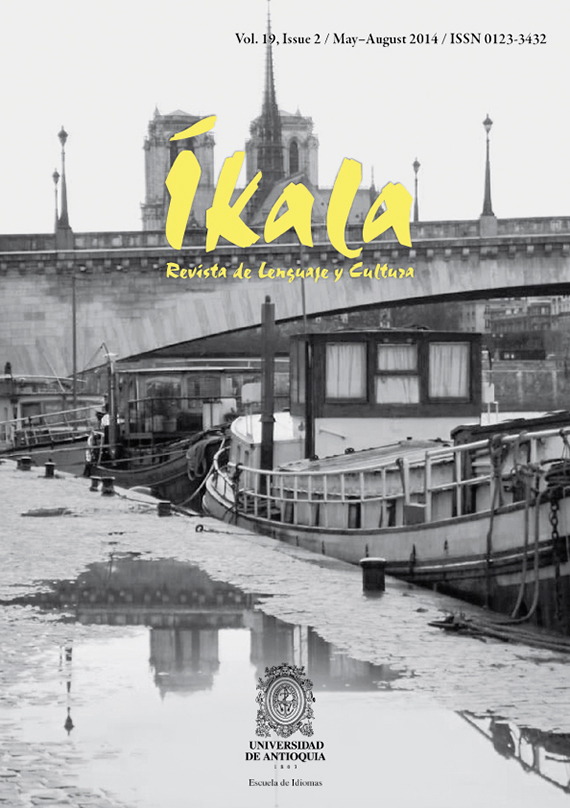O romance de artista em La luz difícil de Tomás González: a arte como evasão da realidade
DOI:
https://doi.org/10.17533/udea.ikala.v19n2a02Palavras-chave:
romance de artista, La luz difícil, Tomás González, arte, realidade, vida e morteResumo
O presente artigo procura abordar o romance La luz difícil do escritor antiquenho Tomás González (Medellín, 1950) a partir de algumas noções próprias do “romance de artista”. Para tanto faz um percurso histórico pelo contexto dessa tradição do romance mostrando as categorias desde as quais pode se ler a obra de González. Além disso, mostra como se revela na obra um interesse do personagem-artista por fazer da arte uma evasão da realidade, que lhe permite, por sua vez, estabelecer um diálogo com o sentido da vida-morte.
Downloads
Referências
Aguilar, D. & Said, E. (2010). Identidad y subjetividad en las redes sociales: Caso Facebook. In Zona próxima. (12), pp. 190-207. Retrieved from:rcientificas. uninor te.edu.co/index .php/zona/ar ticle/ download/1145/725
Bauman, Z. (2005). Amor líquido: Acerca de la fragilidad de los vínculos humanos. Buenos Aires, Argentina: Fondo de Cultura Económica.
Berlanga, I. & Martínez, E. (2010). Ciberlenguaje y principios de retórica clásica. Redes sociales: El caso Facebook. Enl@ce Revista Venezolana de Información, Tecnología y Conocimiento, 7 (2), pp. 47-61. Retrieved from: http://revistas.luz.edu. ve/index.php/enlace/article/viewFile/5517/5336
Bourdieu, P. (1980). El sentido práctico. Madrid. Taurus.
Bourdieu, P. (1984). Distinction: A social critique of the judgement of taste. London, Cambridge, MA: Harvard University Press.
Bourdieu, P. (1990). Sociología y cultura. México D.F., Grijalbo.
Bourdieu, P. (1991). Language and symbolic power. Ed. John Thompson. Cambridge: Harvard University Press.
Bourdieu, P. (1997). Razones prácticas sobre la teoría de la acción. Barcelona. Anagrama.
Bourdieu, P. (2007). Outline of a theory of practice. Cambridge: Polity Press.
Boyd, D. & Hargittai, E. (2010). Facebook privacy settings: Who cares? First Monday, 15(8). Retrieved from: http://firstmonday.org/article/ view/3086/2589#p9
Broncano, F. (2009). La melancolía del cíborg. Barcelona: Herder.
Cáceres, M. D., Ruiz San Román, J. A. & Brändle, G. (2009). ''Comunicación interpersonal y vida cotidiana. La presentación de la identidad de los jóvenes en Internet''. In CIC, Cuadernos de Información y Comunicación. (14), pp. 213-231. Retrieved from: http://revistas.ucm.es/index.php/CIYC/article/ view/CIYC0909110213A/7226
Cárdenas, R. E. (2009). Facebook, un espacio de interacción virtual (Bachelor's thesis). Universidad Javeriana, Bogotá, Colombia.
Creswell, J. W. (2007). Qualitative inquiry and research design: Choosing among five approaches (2nd Ed.). Thousand Oaks, CA: Sage Publications.
Crystal, D. (2008). Txtng: The Gr8 Db8. Oxford University Press.
Cuéllar, S. (2011). , ''Surround me with your love Facebook amor y máscaras: Construcción del sentido en el mundo virtual'' In: Sanabria, F (Ed), Vínculos virtuales. Universidad Nacional de Colombia. Bogotá, Colombia.
Díaz, V. L., Torres, Á. J., and Urrea, M. E. (2010). Facebook como estrategia virtual del ''Self '' (Bachelor's thesis). Universidad Javeriana, Bogotá, Colombia.
García, I. K. (2010). Construcción de la identidad digital de los estudiantes javerianos en Facebook (Bachelor's thesis). Universidad Javeriana, Bogotá, Colombia.
Ferreira, J. (2008). Los lugares del lenguaje en el campo epistemológico de la comunicación. En: Meyra Paez; Gladis Lara. (Org.). Lenguaje e interpretación sociocultural. Avances y perspectivas. 1 ed. Bogotá: Universidad Distrital, 2008b, (1), pp. 167-185.
Freeman, D. (1998). Doing teacher research: From inquiring to understanding. Heinle & Heinle Publishers.
Gutiérrez, A. (2002). Las prácticas sociales: Una introducción a Pierre Bourdieu.Tierradenadie Ediciones. Madrid, España.
Johnson, B., & Christensen, L. (2008). Educational research: Quantitative, qualitative, and mixed approaches. Thousand Oaks, CA: Sage Publications.
Krippendorff, K. (2004). Content analysis: An introduction to its methodology (2nd Ed.). Thousand Oaks, CA: Sage Publications.
Merriam, S. (1998). Qualitative research and case studies applications in education. San Francisco. Jossey Bass Publishers.
Piscitelli, A., Adaime, I. & Binder, I. (Eds.). (2010). El proyecto Facebook y la posuniversidad. sistemas operativos sociales y entornos abiertos de aprendizaje. Madrid, España: Editorial Ariel.
West, A., Lewis, J., & Currie, P., (2009). ''Students' Facebook 'friends': public and private spheres''. In Journal of Youth Studies, 12 (6), pp. 615-627. Retrieved from:http://people.uncw.edu/hakanr/documents/ areparentswelcomeonfb.pdf
Zhao, S., Grasmuck, S., & Martin, J. (2008). ''Identity construction on Facebook: Digital empowerment in anchored relationships''. In Computers in Human Behavior, 24 (5), pp.1816–1836 Retrieved from: http://astro.temple.edu/~bzhao001/Identity%20 Construction%20on%20Facebook.pdf
Downloads
Publicado
Como Citar
Edição
Seção
Licença
Copyright (c) 2014 Íkala, Revista de Lenguaje y Cultura

Este trabalho está licenciado sob uma licença Creative Commons Attribution-NonCommercial-ShareAlike 4.0 International License.












